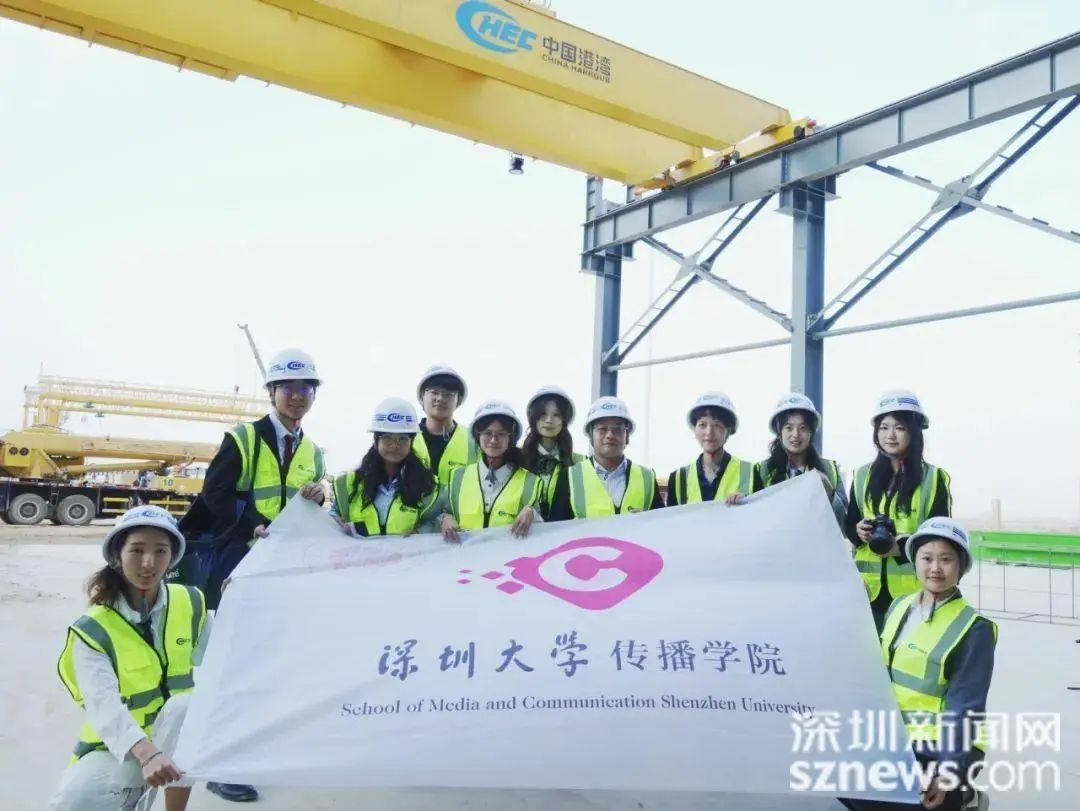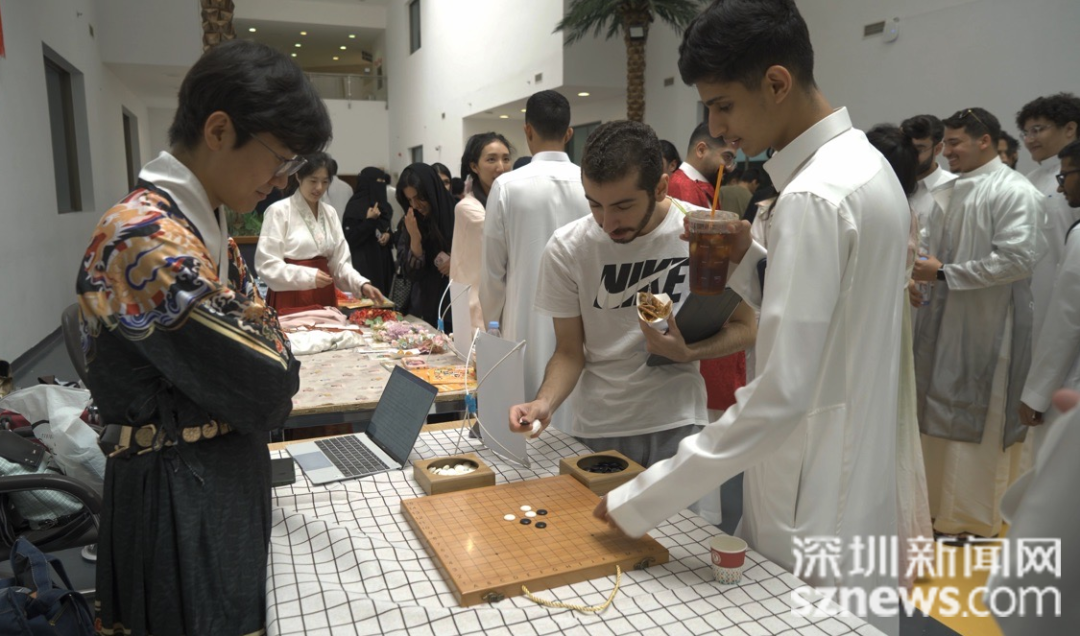Recently, at the invitation of Prince Sultan University of Saudi Arabia, 11 teachers and students from the School of Media and Communication of Shenzhen University went to Saudi Arabia for a 9-day exchange visit in Riyadh and Jeddah. The group engaged in hands-on international communication activities and explored the integration of Chinese and Saudi cultures. Teachers and students of the two schools learned from each other in various forms of cultural and academic exchanges, fostering cross-cultural exchange and understanding.

Members of the practice group pose for a photo with local Saudi students.
Rising “Mandarin Fever” and Growing Appreciation for “Made in China”.
Founded in 1998, Prince Sultan University (PSU), located in Riyadh, the capital of Saudi Arabia, is the first private non-profit university in Saudi Arabia. The Confucius Institute at PSU is the first Confucius Institute jointly established overseas by Shenzhen University. Officially inaugurated and put into operation on June 4, 2023. The institute is open to all sectors of Saudi society, including schools and universities, offering Chinese language teaching and training, Chinese cultural activities and skills training.
It is reported that Saudi Arabia's education department has launched a plan to strengthen Chinese language teaching. The initiative lists Chinese as the second official foreign language course for all secondary schools. It mandates that the fourth teaching period on Sundays and Mondays be dedicated to Chinese language teaching. This approach enables the local people to develop a deeper understanding of China, continually increasing the cultural influence of Chinese culture in the Middle East, and promoting people-to-people communication. On the streets of Riyadh, the group came across the members of the Saudi royal family who were particularly interested in Chinese culture and invited the group to visit the office area.

Photo of the practice group's visit to China Harbor.
Nowadays, many commercial and public places in Saudi Arabia have been using Chinese signage, where you can also find many familiar "Chinese figures” - in Riyadh, Huawei has opened its largest flagship store in Saudi Arabia; China Harbor's projects in Saudi Arabia cover a wide range of fields, including real estate, infrastructure, ports and urban comprehensive development. China's "Belt and Road Initiatives" and Saudi Arabia's “Vision 2030” are closely cooperated, and the collaboration between China and Saudi Arabia in various fields such as trade, investment and financing, construction, energy and new technology development continues to expand, creating opportunities for Chinese enterprises to go overseas.
A local coffee shop clerk blurted out “Friend!” when he learned that the students were from China. He also pointed out the window and said that many daily necessities of Saudi Arabia, as well as the vehicles on the streets, came from China, expressing their great trust in Chinese products.

SZU students present souvenirs to PSU students.
Reaching Out to Each Other: Sino-Saudi Youth Engage in Mutual Learning and Appreciation.
In April this year, the 2024 "Chinese Bridge" Spring Camp organized by the Confucius Institute at Prince Sultan University was a big hit with Saudi students. The participants came to SZU for an in-depth study of Chinese language courses and immersed themselves in traditional Chinese culture through the Chinese Four Arts and intangible cultural heritage roadshows. At the closing ceremony, the SZU choir performed "Farewell" and "Jasmine" for the Saudi teachers and students, highlighting the friendship and bond between the two schools.
After half a year, the civilization dialogue continued with a return trip to Prince Sultan University. Members of the practice group from SZU performed in the PSU studio wearing traditional Chinese costumes and set up booths showcasing diverse Chinese cultural elements. The Saudi students responded with traditional Saudi songs and dances, Arabic coffee-making demonstrations, calligraphy demonstrations, traditional currency collections, etc. The Chinese and Saudi youths interacted warmly and inspired great sparks.

Students are playing backgammon.
Prof. Li Hui from the School of Media and Communication of Shenzhen University said, “Based on the existing cooperation between the Confucius Institute and both institutions, which has laid a good foundation, we hope to expand and deepen the cooperation gradually. We hope to regularize the bilateral cultural and academic exchanges, especially in the field of social sciences, including journalism and communication. We also expect to carry out various exchanges, such as sending international students, visiting scholars, co-organizing academic conferences, etc.”
One of the members of this practice group, Li Yanni, a student of SMC in the class of 2022, said that international communication occurs at both governmental and interpersonal levels. The practice of individual interactions helps to break down stereotypes and foster a more accurate understanding, making one of the most effective ways of international communication.

Students from SZU are demonstrating the making of Chinese knots and lacquer fans.
More than 2,000 years ago, the Silk Road on land teemed with merchants and travelers, while the Spice Road at sea was full of sails. More than two millennia later, the two ends of the Asian continent continue to maintain a vibrant interaction. As a Chinese saying goes: "Even mountains and seas cannot distance people with common aspirations." Although the exchange activities have come to an end, the teachers and students from both institutions have established a deep friendship. After returning, they continued to stay in touch through social media platforms. Through this exchange journey, the group not only brought insights about Saudi Arabia to China but also enhanced Saudi youths’ understanding of Chinese culture.
From: Shenzhen News 2024, November 19
Chinese Reporter: Wu Bingran / Correspondent Feng Shuoyan
English Reporter: Li Yanni
Instructor: Zhang Tiantian